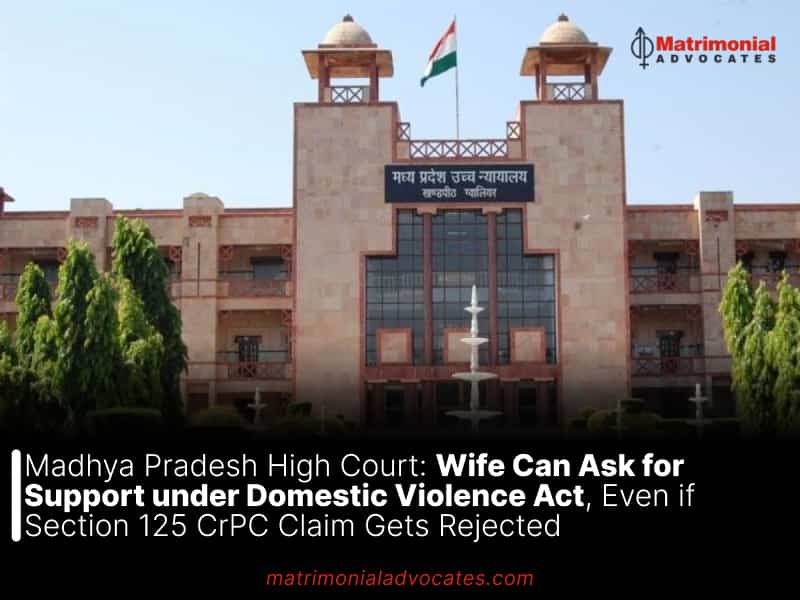
The Court passed the order on a plea challenging an order directing a husband to pay ₹5,000 as interim maintenance under the Domestic Violence Act to his wife.
The Madhya Pradesh High Court recently opined that the disapproval of a wife’s petition for maintenance under Section 125 of the Code of Criminal Procedure (CrPC) does not preclude her from pursuing pecuniary relief under the auspices of the Protection of Women from Domestic Violence Act (DV Act).
Justice Prem Narayan Singh explicated that determinations in cases adjudicated under Section 125 CrPC and Section 12 of the DV Act lack reciprocal binding precedent.
“If, in proceeding under Section 125 of CrPC, the application of wife seeking maintenance is rejected by the Family Court, such wife would not be precluded from claiming maintenance or other monetary remedy under the provisions of the DV Act,” the Court’s order stated.
The court rendered a determination in response to a criminal revision petition challenging a magistrate’s directive ordering the husband to provide interim maintenance of ₹5,000 to his wife under the auspices of the Domestic Violence (DV) Act.
The primary contention centered on the contention that the woman’s application for maintenance under Section 125 of the Code of Criminal Procedure (CrPC) had previously been adjudicated adversely by a family court, which determined that her voluntary decision to live separately from her husband warranted denial of maintenance.
It was posited that the legal contentions articulated in the application under Section 12 of the DV Act were analogous to those presented in the plea under Section 125 CrPC.
Furthermore, the retired petitioner, formerly of the Armed Forces, advanced the claim of an onerous duty to provide care for his parents and a younger sister.
The wife’s legal representative refuted these assertions, underscoring the legal distinction between the proceedings under Section 125 CrPC and the DV Act.
The court engaged in a deliberative process to ascertain whether the family court’s adjudication under Section 125 CrPC could exert a determinative impact on a subsequent adjudication under the DV Act, and further contemplated the potential interrelationship between these concurrent proceedings involving the same party.
In rendering its decision, the bench drew jurisprudential guidance from the Supreme Court’s precedent in Nagendrappa Natikar vs. Neelamma, wherein it was pronounced that a determination under Section 125, CrPC does not operate as an impediment to a wife seeking redress under the Hindu Adoption and Maintenance Act.
“In upshot of the aforesaid ratio, the law laid down by Hon’ble the Apex Court, it is obviously established that a decision taken in the case under Section 125 of Cr.P.C. and under Section 12 of the D.V. Act, have no binding effect on each other,” the High Court held.
The Court underscored the applicability of Section 43 of the Evidence Act, which unequivocally establishes that judgments, orders, or decrees, excluding those enumerated in Sections 40, 41, and 42, bear legal relevance only when their existence pertains to a fact in issue or is germane under another provision of the Act.
Consequently, the bench determined that the findings of the family court, specifically addressing the absence of justifiable cause for granting maintenance, were patently irrelevant to the proceedings under the Domestic Violence (DV) Act.
Furthermore, the bench invoked a legal precedent from the Supreme Court, emphasizing the principle that the receipt of maintenance under one statutory provision does not preclude the claimant from seeking redress under a divergent legal framework.
In accordance with these legal considerations, the Court adjudicated the husband’s petition to be devoid of legal merit and accordingly dismissed it.





